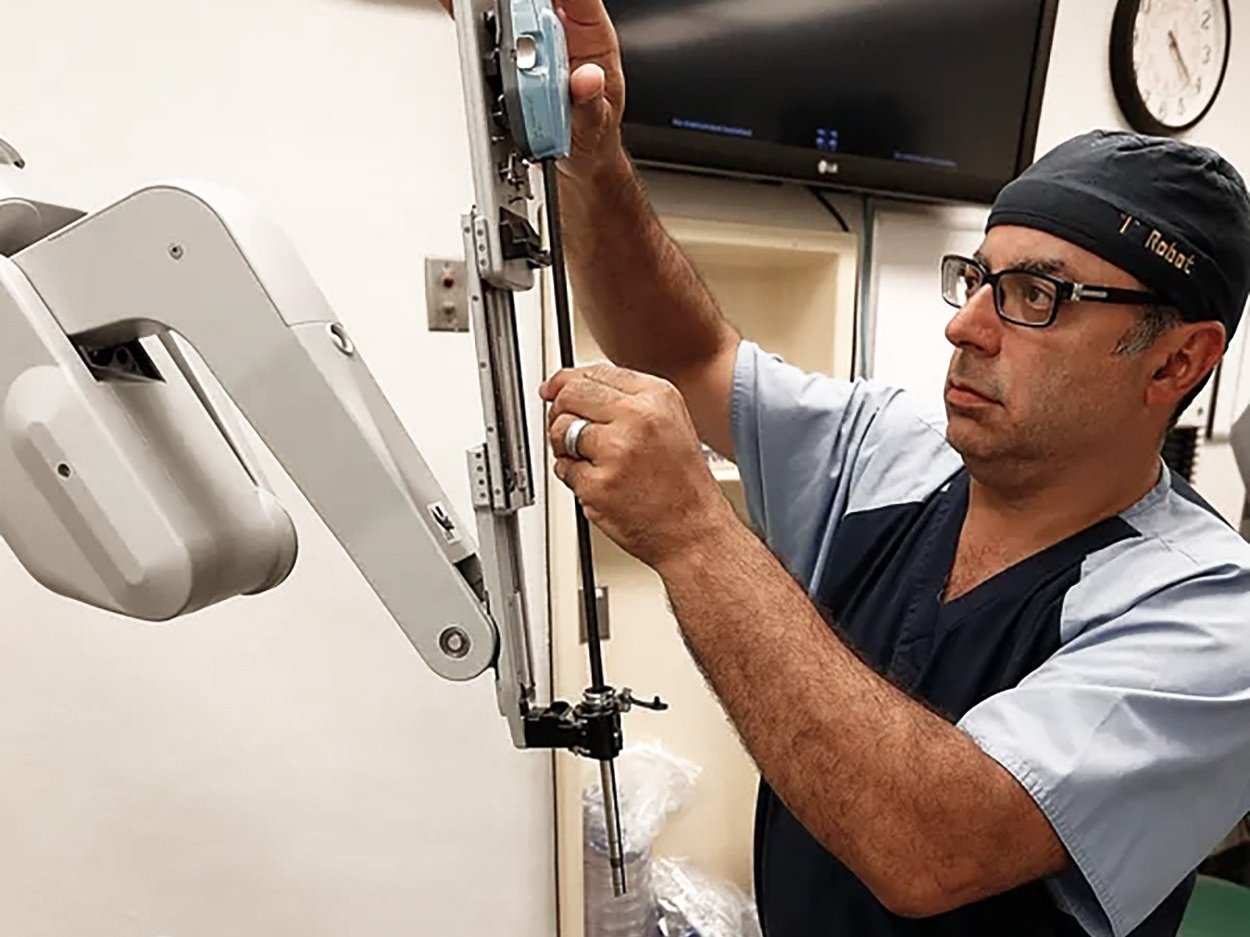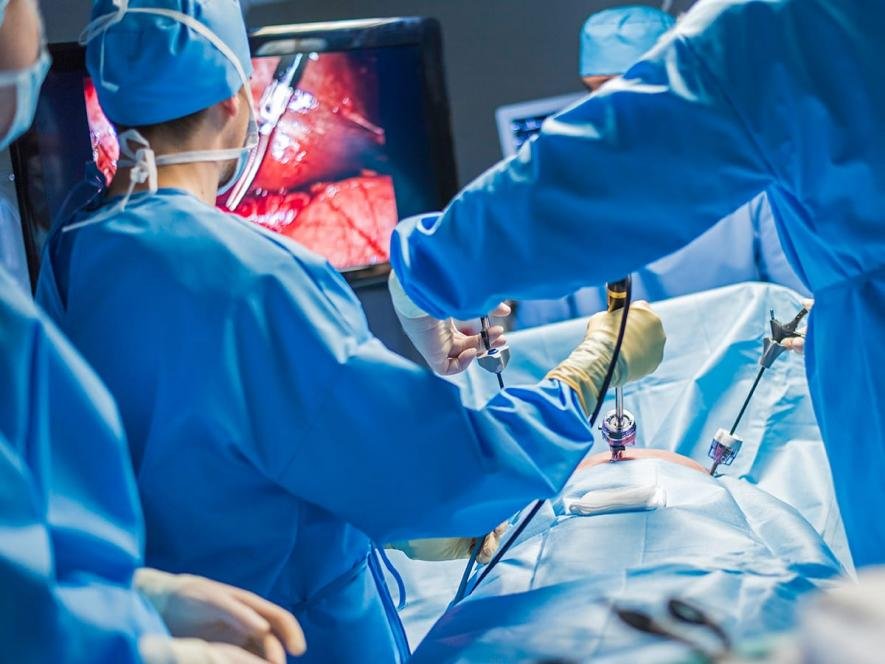
SERVICES
More About Dr. Hanjani’s Services
General Obstetrics, Gynecology & Infertility
The practice focuses on providing a broad base of Obstetric and Gynecological care, as well as focusing on important women’s health issues from puberty to menopause. Dr. Hanjani specializes in laparoscopic and hysteroscopic procedures, robotic surgery, high-risk pregnancies, sexual dysfunction, teen health and the unique challenges of menopause, to mention a few. He also offers treatment for infertility issues, including work-up and drug treatment.
Laparoscopic and hysteroscopic procedures
Laparoscopic surgery ("belly button surgery") allows treatment of many intra-abdominal conditions without having to resort to a large painful scar. Benefits of this surgery include reduced pain due to the smaller incisions, less bleeding and shorter recovery time. The patient often goes home on the same day as surgery.
Hysteroscopic surgery involves placing a small telescope instrument through the vagina within the uterine cavity and examining the cavity. Polyps, fibroid tumors and scar tissue can be removed without the need for a more major surgery. In patients with heavy periods, this approach has fewer surgical risks than a hysterectomy. It can reduce menstrual flow or be used to remove fibroids or polyps while preserving a woman’s fertility.
Robotic (da Vinci®) Surgery
Dr Hanjani can preform hysterectomies and other gynecologic procedures using robot-assisted surgery with the da Vinci® Surgical System. For certain patients, this may be the most effective and least invasive treatment option. Through tiny incisions, mostly 1 cm or less, surgeons using the da Vinci System can operate with greater precision and control, minimizing the pain and risk that can be associated with larger incisions while increasing the likelihood of a fast recovery and offering excellent clinical outcomes.
With the da Vinci System surgeons use small incisions, miniaturized instruments and a high-definition 3D camera to view a magnified, high-resolution three-dimensional image of the surgical field on a computer console. The state-of-the-art robotic and computer technologies scale, filter and seamlessly translate the surgeon's hand movements into precise micro-movements of the da Vinci instruments.
The system is not programmed, nor does it make decisions. Every surgical maneuver is performed by your surgeon guiding each and every movement of the da Vinci System. For more information please go to: https://www.davincisurgery.com.
Abdominal Surgery
When medication and non-invasive procedures are unable to relieve symptoms, surgery may be the most effective treatment for a range of gynecologic conditions. These include uterine fibroids, endometriosis, pelvic pain conditions and menorrhagia, or excessive bleeding.
Traditional open gynecologic surgery, using a large incision for access to the uterus and surrounding anatomy, has been the standard approach to most procedures for many years. The incision is made in the lower abdomen as a “bikini” cut.
However, the disadvantages of open surgery may include significant pain, a longer recovery process and commonly more blood loss. When possible, less invasive approaches are taken.
Acessa Procedure
The Acessa procedure allows for a thorough and minimally invasive method of treating your fibroids. It was designed to preserve healthy uterine tissue by focusing treatment only on the fibroid (versus cutting into the uterus or removing it completely) while relieving symptoms caused by fibroids.
High Risk Pregnancies
If you are pregnant and suffering with hypertension, diabetes, or are expecting a multiple birth, you may be considered a high-risk pregnancy. Dr. Hanjani regularly cares for women considered high risk. Other times, a pregnancy may unexpectedly become high risk, and both you and your doctor have to be prepared for this. Dr. Hanjani is a qualified obstetrician who has more than 30 years of experience caring for mothers during this important time of their lives. He has delivered approximately 5500 babies.
Menopause
Dr. Hanjani has been caring for women going through the “The Change” for many years. The symptoms, and physiological and emotional changes of menopause are very real and need careful attention and treatment in many women. A plan can be formulated for the use of medical and non-medical options to ease your symptoms.
Adolescent Gynecology
Dr. Hanjani recognizes the sensitivity of young women who seek gynecological care. A particularly gentle and thoughtful approach and examination is called for. Dr Hanjani has many years of experience dealing with this group of younger gynecologic patients.
Additional Services
Office global endometrial ablation
Office global endometrial ablations are safe and effective office procedures used to treat excessive menstrual bleeding (menorrhagia). The procedures can be performed in under 10 minutes in the office with return to work the next day. In many women this removes the need for hormone therapy or hysterctomy to control bleeding problems.
Colposcopy
Colposcopy is a diagnostic procedure done when a PAP test result shows abnormal changes in the cells of the cervix. Colposcopy provides more information about the abnormal cells. Colposcopy also may be used to further assess genital warts on the cervix, cervicitis (an inflamed cervix), bleeding and benign (non-cancerous) growths, such as polyps. In general, there is no discomfort with this procedure and it is preformed in the office.
LEEP
The LEEP procedure is a way to remove abnormal cells from the cervix that were identified by a PAP test. After giving numbing medicine into the cervix, the LEEP device uses a thin wire loop that acts like a scalpel (surgical knife). An electric current is passed through the loop, which cuts away a thin layer of the cervix where the abnormal cells are.
Ultrasound
Ultrasound is used to examine the pelvic organs. An ultrasound exam can help check and monitor a fetus’ health, find causes of pelvic pain and abnormal bleeding or other menstrual problems. It can be used to identify a pelvic mass and assess conditions such as infertility among other things. These can be scheduled in the office by Premier ultrasound service, or in the adjoining hospital.
Blood Draw Station
A GenPath Laboratories satellite blood draw station is located within our office for our patient's convenience. Also available are a Quest Laboratories satellite blood drawing station within our office building and Hospital Laboratory at the Moakley outpatient center at Good Samaritan Medical Center which adjoins our offices.













